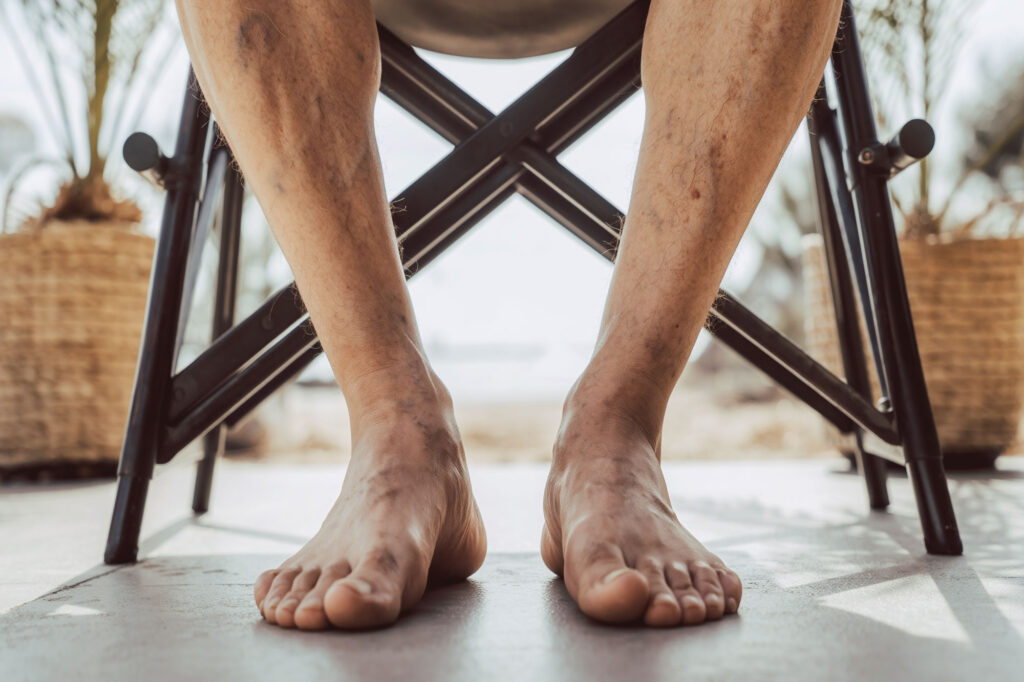Poor Vein Circulation Treatment in Tampa, FL
Better circulation. Healthier legs.
Identify and treat poor vein circulation with expert, minimally invasive care.
Learn More About Poor Circulation
Poor circulation in the legs is often linked to chronic venous insufficiency (CVI), also called chronic venous disease (CVD). While arteries carry oxygen-rich blood from the heart to the body, veins are responsible for returning deoxygenated blood back to the heart.
When the leg veins are unable to efficiently move blood upward against gravity, blood begins to pool in the legs. This backward flow leads to increased pressure in the veins and a wide range of uncomfortable symptoms commonly described as “poor circulation.”
- Is Your Leg Problem, A Vein Problem?
How Vein Circulation Normally Works
When you walk, your calf muscles act as a pump, squeezing the leg veins and pushing blood upward toward the heart. One-way valves inside the veins keep blood moving in the correct direction.
When these valves weaken or become damaged—often due to prolonged sitting or standing—blood can leak backward and collect in the legs. Over time, this impaired flow contributes to symptoms associated with poor circulation and vein disease.
If you are experiencing circulation-related symptoms, CVI or another vascular condition may be the cause. The specialists at Vein911® Vein Treatment Centers can evaluate your circulation and identify the underlying issue.

Signs of Poor Circulation
Symptoms and risk factors associated with poor circulation may be influenced by several factors, including:
- Heredity
- Pregnancy
- Hormonal changes
- Aging
- Jobs that require prolonged standing or sitting
- Obesity
- Previous leg injury
At Vein911®, every patient receives a thorough evaluation. Based on our findings, we recommend the most effective treatment options to support long-term vein health and overall well-being.
Wearing Graduated Compression Hose May Help
Your leg veins act like flexible tubes that return blood to the heart. Graduated compression hose gently compress these veins, helping blood move upward more efficiently.
Wearing compression stockings is often compared to placing your thumb over a garden hose—the pressure increases flow. This improved circulation offers both medical benefits and symptom relief.
Why Use Graduated Compression Hose?
There is strong scientific evidence supporting the benefits of properly measured and fitted medical-grade graduated compression hose. Many patients describe compression as “wearing a pill instead of taking one.”
Graduated compression may help:
- Reduce itching, heaviness, fatigue, pain, throbbing, swelling, night cramps, and restless legs
- Improve skin changes related to chronic venous disease
- Support healing of venous leg ulcers and help prevent recurrence
- Lower the risk of serious blood clots, including deep vein thrombosis (DVT)
Compression stockings may also help:
- Manage symptoms in patients with an active DVT
- Prevent worsening or extension of a blood clot
- Reduce long-term complications after a previous DVT
While it may sound exaggerated, wearing high-quality, properly fitted compression hose can significantly enhance circulation and leg comfort.

Why Choose Vein911® for Poor Vein Circulation Treatment in Florida?
At Vein911® Vein Treatment Centers, we deliver award-winning, non-surgical vein care rooted in expertise, innovation, and compassion. Led by Dr. Chris Pittman—four-time Tampa Magazine Top Doctor (2022–2025)—our team is dedicated exclusively to vein health.
Patients trust Vein911® because we combine advanced medical care with genuine human connection. From busy professionals to athletes and caregivers, we treat every patient like a friend and focus on helping you feel great again.
Is Your Leg Problem a Vein Problem?
Poor circulation is often a sign of underlying vein disease—and it is highly treatable. Vein911® Vein Treatment Centers are Florida’s leading clinics dedicated exclusively to diagnosing and treating vein conditions.
Call (813) 544-8715 today to schedule your personalized consultation at Vein911® Vein Treatment Centers.
